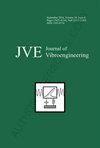Dynamic behavior of risers under nonlinear oceanic environmental loading
IF 0.9
Q4 ENGINEERING, MECHANICAL
引用次数: 0
Abstract
The riser system acts as the vital link between the subsea blow-out preventer and the drilling platform. Affected by factors like top tension and marine environmental forces, the riser undergoes deformation and wear, carrying the risk of environmental pollution and financial losses upon failure. Hence, this study examines the riser's dynamic response to marine environmental loading. Initially, the motion differential equation for the riser system under the influence of nonlinear oceanic load is deduced using the principle of minimum potential energy and the variational method for extremum seeking. Subsequently, a nonlinear wave-current load model based on the Morrison equation is established, and the resulting equation is discretized into a finite element model using third-order Hermite interpolation function and the Galerkin weighted residual method. Finally, the dynamic response of the riser is scrutinized employing the Newmark numerical integration method. The study also investigates the impact of both oceanic environmental parameters and drilling parameters on the riser’s dynamic behavior. Comparative analysis of the numerical results reveals that the maximum displacement of the riser occurs at the middle section, whereas the maximum deflection angle is observed at the end of the riser. The periodicity of the deflection angle response is influenced by the position of the riser, showing a trend of decreasing and then increasing from the middle section towards the ends. Notably, the top tension and the velocity of the surface tidal current significantly affect the dynamic behavior of the riser. The findings of this study provide a theoretical foundation for the assessment of riser reliability and the determination of operational parameters.非线性海洋环境载荷下立管的动力特性
立管系统是连接海底防喷器和钻井平台的重要环节。立管受顶部张力和海洋环境力等因素的影响,会发生变形和磨损,一旦发生故障,会带来环境污染和经济损失的风险。因此,本研究考察了隔水管对海洋环境载荷的动态响应。首先利用最小势能原理和变分求极值法推导了非线性海洋载荷作用下立管系统的运动微分方程。随后,建立了基于Morrison方程的非线性波流负荷模型,并利用三阶Hermite插值函数和Galerkin加权残差法将该模型离散为有限元模型。最后,采用Newmark数值积分法分析了隔水管的动力响应。该研究还探讨了海洋环境参数和钻井参数对隔水管动态行为的影响。数值结果对比分析表明,立管的最大位移出现在中部,最大挠度出现在立管末端。挠度角响应的周期性受隔水管位置的影响,从中部到末端呈现先减小后增大的趋势。值得注意的是,顶部张力和表面潮流速度对隔水管的动力行为有显著影响。研究结果为隔水管可靠性评估和运行参数的确定提供了理论依据。
本文章由计算机程序翻译,如有差异,请以英文原文为准。
求助全文
约1分钟内获得全文
求助全文
来源期刊

Journal of Vibroengineering
工程技术-工程:机械
CiteScore
1.70
自引率
0.00%
发文量
97
审稿时长
4.5 months
期刊介绍:
Journal of VIBROENGINEERING (JVE) ISSN 1392-8716 is a prestigious peer reviewed International Journal specializing in theoretical and practical aspects of Vibration Engineering. It is indexed in ESCI and other major databases. Published every 1.5 months (8 times yearly), the journal attracts attention from the International Engineering Community.
 求助内容:
求助内容: 应助结果提醒方式:
应助结果提醒方式:


